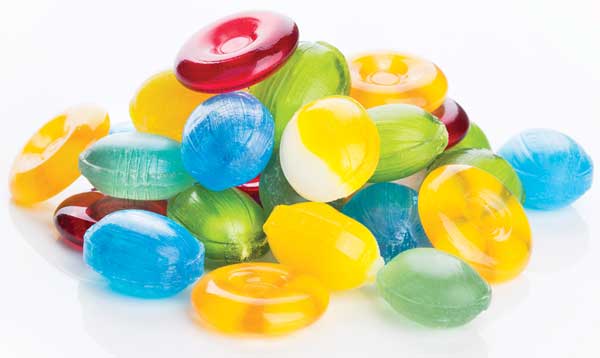Targeting the Sweet Spot
NUTRACEUTICALS
Peruse any consumer magazine or watch some of today’s commercials, and you will read or hear some information that mentions sugar. Whether it’s about too much sugar in today’s diets or the ill effects that excess sugar can have on health, there is no question that reducing sugar is at the forefront of consumers’ minds today. In fact, at IFT17, research firm Mintel presented research showing that the top two ingredients consumers are trying to avoid are high fructose corn syrup and sugar.
Health is the overall reason for consumers focusing on reducing sugar in their diets. In 2015, BENEO released results from a survey of 1,000 consumers it commissioned by Ipsos. The respondents indicated they are aware that the amount and type of sugars play a major role in coping with health concerns such as weight management, stress, and fatigue. The respondents named healthy diet (58%), weight management (56%), tooth decay (37%), and diabetes (28%) as concrete reasons to limit sugar intake.
New dietary guidelines and labeling laws have also added to the desire for less sugar and fewer calories in foods and beverages. The U.S. Food and Drug Administration finalized new sugar labeling regulations in May 2016 calling for “added sugars” in grams and as percent Daily Value to be included on package labels. And the new Dietary Guidelines recommend consuming less than 10% of calories per day from added sugars.
 Food and beverage companies are busy reformulating and developing foods and beverages containing less sugar. For example, Sweettauk in July introduced no-sugar-added lemonades to its line of beverages. Each bottle contains between 1–5 grams of sugar. According to the company, this was accomplished with the use of a next-generation stevia.
Food and beverage companies are busy reformulating and developing foods and beverages containing less sugar. For example, Sweettauk in July introduced no-sugar-added lemonades to its line of beverages. Each bottle contains between 1–5 grams of sugar. According to the company, this was accomplished with the use of a next-generation stevia.
In addition to less sugar, consumers also want clean, simple, and natural labels with ingredients that are familiar. According to BENEO’s research, consumers indicated that there is awareness that some sugars are better for their health than others. Sugar from honey, for example, was perceived as the most appealing sweetener because it is natural. In addition, about two out of three respondents (64%) agreed that naturally derived sugars from fruits, vegetables, and plants are healthier.
Sweeteners that are plant-based and sometimes offer additional health benefits are high in consumer appeal. Here is a look at some of the sweeteners being used today that satisfy consumers’ desire for less sugar, clean labels, and sweet taste.
Stevia
Stevia is one of today’s most popular natural sweetener alternatives that has moved into the mainstream. According to Cargill’s internal media monitoring system, media mentions of stevia have nearly doubled during 2017, driven by new Instagram activity and an uptick in Twitter posts. The primary topics discussed around stevia are its benefits as a sugar replacement and uses of stevia in recipes and drinks.
In the past, stevia has been associated with a bitter aftertaste, but companies’ innovative research and development endeavors have resulted in various stevia ingredients with cleaner taste profiles and high levels of sweetness. Cargill, for example, offers a line of stevia ingredients, including Truvia (high-purity Reb A from the stevia leaf), ViaTech stevia sweetener (from the stevia leaf), and EverSweet commercially viable minor glycosides (Reb M and Reb D). EverSweet is Cargill’s next-generation sweetener that allows up to 100% sugar reduction. “Cargill food scientists have invested more than 150,000 hours studying the stevia leaf to develop sweeteners with the optimal balance of sweetness and taste,” says Andy Ohmes, global director of high intensity sweeteners. “Through our research, we found trace amounts of the glycosides Reb M and Reb D in the stevia leaf, which offer heightened sweetness and a taste similar to real sugar. While these glycosides are rare in the stevia plant, we can produce them through fermentation.” The resulting product, EverSweet, will be commercially available in 2018.
Archer Daniels Midland Company (ADM) in March introduced SweetRight stevia. Sourced from the stevia leaf, it is up to 250 times as sweet as sugar and offers a clean label, GRAS, non-genetically modified (non-GM), and plant-based sweetener solution. SweetRight offers a range of stevia ingredients extracted from the stevia leaf using a proprietary process. It is available in three forms—RA, RA granular, and EMS Enzymatically Modified Stevia.
Ingredion and SweeGen in July announced a new addition to its line of stevia leaf sweeteners with the successful commercialization of BESTEVIA Reb D. BESTEVIA Reb D provides additional flexibility for formulators looking to match the time intensity response curve of sucrose. Unique patented processes that start with the stevia leaf enabled SweeGen to introduce BESTEVIA Reb M and now BESTEVIA Reb D as alternatives to sugar and artificial sweeteners.
Adding to stevia’s natural halo, Sweet Green Fields in July announced that it had achieved Non-GMO Project Verification for 28 of its stevia ingredients along with its standard offerings of purified Reb A ingredients. The company also announced a partnership with Tate & Lyle to deliver on the increased demands for innovative non-nutritive sweetening solutions.
 In June, PureCircle announced the successful production of the first stevia leaf extract from the new proprietary stevia leaf, StarLeaf stevia. StarLeaf stevia contains more than 20 times more sugar-like steviol glycoside content compared to standard stevia leaf varieties. The extract from this non-GM proprietary leaf variety provides beverage and food developers a plant-based, zero-calorie sweetener. The StarLeaf stevia leaf is a product of the company’s long-term investment of $100 million in its PureCircle Stevia Agronomy Program.
In June, PureCircle announced the successful production of the first stevia leaf extract from the new proprietary stevia leaf, StarLeaf stevia. StarLeaf stevia contains more than 20 times more sugar-like steviol glycoside content compared to standard stevia leaf varieties. The extract from this non-GM proprietary leaf variety provides beverage and food developers a plant-based, zero-calorie sweetener. The StarLeaf stevia leaf is a product of the company’s long-term investment of $100 million in its PureCircle Stevia Agronomy Program.
Fruit and Vegetable Extracts
Monk fruit is a popular natural sweetener that is growing in use for sugar reduction. Sourced from the luo han guo fruit, it is up to 200 times as sweet as sugar. This past March, ADM launched VerySweet monk fruit, which has a delicious sweet taste without bitterness. This low-calorie, GRAS sweetener solution may be used alone, blended, or as part of a complete sweetening system. For example, ADM’s experts can formulate monk fruit in tandem with stevia for a perfect blend of flavor and cost benefits.
ADM also recently launched Fruit Up fruit extracts. Fruit Up is produced by a purely physical extraction process from various fruits, without the use of enzymes or chemical additives. The resulting fruit syrup’s sweet taste and neutral flavor enable ADM’s customers to sweeten their products, reduce added sugar, and round out overall flavor and mouthfeel. In addition, based on multiple independent scientific studies, Fruit Up has a proven low GI value of less than 55. Therefore, consumption of Fruit Up results in only moderate changes of the normal blood glucose level following a meal, thus maintaining a more constant blood glucose level for a longer time period.
--- PAGE BREAK ---
Icon Foods (formerly Steviva Ingredients) recently launched PuRefine, a proprietary filtration system in monk fruit extraction. The PuRefine purification system uses natural proprietary resins to remove compounds in monk fruit and stevia that may impart off-notes. The purification process is a two-stage resin column technology that uses resins from polymers that can attach to unwanted compounds in a monk fruit solution that is passed through them. This results in the removal of all aftertaste and off-notes that in the past may have been reminiscent of melon rind. Icon has launched the PuRefine process with its PuRefine Ultra-Purified MonkSweet Monk Fruit Extract line. The company is also working to implement the technology with its SteviaSweet 95-60 and SteviaSweet RA98 stevia extracts, which are expected to be introduced to the ingredient marketplace in early fourth quarter of 2017.
In addition to monk fruit and stevia, Icon Foods offers naringin, a flavonoid that occurs naturally in citrus fruits, especially in grapefruit, where it is responsible for the fruit’s bitter taste. When naringin is treated with proprietary natural alkaline compounds and then hydrogenated, it becomes roughly 1,500 times sweeter than sugar.
Lucuma powder from BI Nutraceuticals is derived from the lucuma fruit, often referred to as the “gold of the Incas.” It is rich in nutrients such as beta-carotene and dietary fiber. The fruit’s maple-like sweetness makes it a sweet addition for a wide variety of applications such as smoothies and nutrition bars. BI Nutraceuticals also offers lucuma in a water-soluble powder extract.
Vegetable juice concentrates are reduced-calorie alternatives to traditional sweeteners and contribute to added-sugar reduction in food and beverage products. Kerr Concentrates offers Sweet Squash 200, a custom formulation of butternut squash and pumpkin juice concentrates that delivers an increased sweetness profile without impacting added-sugar labeling. Also available is a jicama juice concentrate that is sweet in flavor.
Carolina Sweet from Carolina Innovative Food Ingredients is a higher Brix, vegetable-based clean label replacement for other sweeteners and compares favorably to popular ingredients like agave syrup, honey, brown rice syrup, and high fructose corn syrup. Sourced from a consistent supply of U.S.-grown sweet potatoes, Carolina Sweet has a low fructose content.
Fiber and Prebiotics
Prebiotics and some dietary fibers can be ideal sweetening solutions because of their sweet flavor and reported health benefits. The results from a human taste study carried out by the Flavour and Sensory Science Centre at the University of Reading suggest that naturally sweet prebiotic fibers could replace high-calorie sugars in food and drink products. The human taste study used a panel of 10 experienced experts to test the sweetness of six customized prebiotic sweeteners derived from several high-intensity sweeteners developed by OptiBiotix. The customized oligosaccharides demonstrated sweetness of between 140–223 times the sweetness of an equivalent concentration of sugar. The study showed that there was a large reduction in bitterness without any effect on sweetness. Previous human taste studies have confirmed the safety and sweetness of the prebiotic sweeteners.
BENEO’s Orafti inulin and oligofructose are prebiotic fibers derived from chicory roots. They can help to reduce sugar levels up to 30% because of their relative sweetness compared to that of sucrose. In addition, they have reported health benefits in calcium absorption, digestive health, and blood sugar management.
Ingredion’s soluble prebiotic fiber, NutraFlora is 30% as sweet as sugar, with fewer calories and a similar sweetness profile. Produced from non-GM sucrose (cane sugar), NutraFlora is a short chain fructooligosaccharide that can also provide the body lost as a result of reduced sugars in beverages, improve mouthfeel lost from fat reduction, extend flavor and sweetness, and allow for a potential fiber declaration on the label.
ADM/Matsutani offers Fibersol soluble dietary fiber ingredient. Each gram of the soluble corn fiber ingredient is 90% fiber and provides only 0.02 grams of sugar and 1.6 kcal. The ingredient can replace many of the non-sweetening functional properties of sugar. “Fibersol is helping formulators ‘redo’ sugar, by reducing, rebalancing, or replacing added sugar as needed,” says Doris Dougherty, Fibersol technical service representative at ADM. In addition, recent work has shown that Fibersol can provide an increased feeling of satiety, leaving consumers feeling fuller for longer periods of time. Consuming 10 g of Fibersol with a meal can increase certain satiety hormones and delay hunger feelings. It can also help attenuate the spike in blood glucose after a meal and does not alter healthy, steady-state blood glucose or insulin levels.
Allulose, Isomaltulose, and Sugar Alcohols
Allulose is a rare sugar that exists in very small quantities in nature. It can be found in foods such as figs, raisins, molasses, and maple syrup. Research from Tate & Lyle shows that its DOLCIA PRIMA Allulose does not raise blood glucose or insulin levels in healthy individuals and those with type 2 diabetes. In March, Tate & Lyle introduced DOLCIA PRIMA Crystalline Allulose, a low-calorie solution that provides the full taste and enjoyment of sugar, but without all the calories. This is a new line extension to DOLCIA PRIMA Allulose. The new crystalline version opens up new categories and applications such as tabletop sweeteners, dry beverage and meal replacement mixes, fat-based creams, and chocolate confectionery.
 Isomalt is a naturally sourced sugar replacer made from pure beet sugar. BENEO offers Isomalt, which is produced in a two-stage process: an enzymatic treatment of sucrose followed by hydrogenation. Isomalt from BENEO provides a taste profile almost equal to sucrose but with a softer sweetness intensity and with only half the calories. BENEO’s Isomalt has received European Food Safety Authority health claims for both its low-glycemic and tooth-friendly characteristics. At ISM 2018, BENEO featured Isomalt in innovative sugar-free candies: Fruit Veggie Twister, an orange-carrot-ginger candy, and Hot-Cool-Booster, a stamped candy-in-candy with a thin chili-fruit layer covering the lemon-menthol core.
Isomalt is a naturally sourced sugar replacer made from pure beet sugar. BENEO offers Isomalt, which is produced in a two-stage process: an enzymatic treatment of sucrose followed by hydrogenation. Isomalt from BENEO provides a taste profile almost equal to sucrose but with a softer sweetness intensity and with only half the calories. BENEO’s Isomalt has received European Food Safety Authority health claims for both its low-glycemic and tooth-friendly characteristics. At ISM 2018, BENEO featured Isomalt in innovative sugar-free candies: Fruit Veggie Twister, an orange-carrot-ginger candy, and Hot-Cool-Booster, a stamped candy-in-candy with a thin chili-fruit layer covering the lemon-menthol core.
Isomaltulose is also made from beet sugar. BENEO’s isomaltulose, Palatinose, provides full carbohydrate energy (4 kcal/g) in a more balanced way, resulting in a low-glycemic effect. It helps to improve fat oxidation during physical activity leading to a prolonged energy supply. It is also non-cariogenic. Palatinose has a mild, natural sweetness (approximately 50% of sucrose), without any aftertaste.
Erythritol is a sugar alcohol that has made a name for itself because it provides zero calories and tastes like sugar. Cargill’s Zerose erythritol is produced by fermentation. This zero-calorie bulk sweetener looks and tastes like sugar, making it ideal for food and beverage applications promoting sugar reduction and weight management. The starting material is a simple sugar-rich substrate, which is fermented using a yeast to yield erythritol. It is also non-cariogenic and is now Non-GMO Project Verified.
Next month’s Nutraceuticals column will give an update on healthy fats.
www.ift.org
Members Only: Read more about sweeteners at ift.org. Type the keyword into the search box at the upper right side of the home page.
 Linda Milo Ohr,
Linda Milo Ohr,
Contributing Editor
Denver, Colo.
[email protected]


